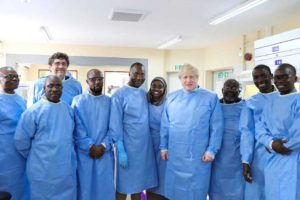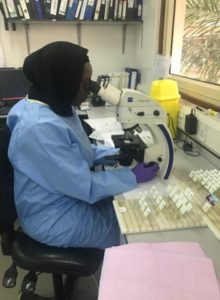My advice to other women in health is to encourage one another. Be your sister’s keeper” Tutty Isatou Faal-Jawara, Scientific Officer, Laboratory Supervisor of the TB Diagnostics Laboratory of MRCG at LSHTM in The Gambia.
 Tutty Isatou Faal-Jawara, a scientific officer, works as the Lab Supervisor of the Tuberculosis Diagnostics Laboratory of the Medical Research Council Unit The Gambia (MRCG) at the London School of Hygiene and Tropical Medicine (LSHTM) in The Gambia. Tutty coordinates and manages the direct supervision of all activities as well as the day-to-day operations of the laboratory under the supervision of the Lab Manager. Over the past 11 years of her career as a biomedical scientist, she has worked with a wide range of scientists and technicians, both in clinical microbiology and research mycobacteriology, specifically catering to the needs of the outpatient department, the ward and private patients.
Tutty Isatou Faal-Jawara, a scientific officer, works as the Lab Supervisor of the Tuberculosis Diagnostics Laboratory of the Medical Research Council Unit The Gambia (MRCG) at the London School of Hygiene and Tropical Medicine (LSHTM) in The Gambia. Tutty coordinates and manages the direct supervision of all activities as well as the day-to-day operations of the laboratory under the supervision of the Lab Manager. Over the past 11 years of her career as a biomedical scientist, she has worked with a wide range of scientists and technicians, both in clinical microbiology and research mycobacteriology, specifically catering to the needs of the outpatient department, the ward and private patients.
Tutty works in an ISO 15189 Lab on first line diagnostics of tuberculosis. ISO 15189 is an international standard that specifies the requirements for quality and competence for the management system particular to medical laboratories. Her role as Lab Supervisor includes, coordinating, providing oversight monitoring in the implementation and continuation of ISO 15189 standards, and monthly status reports to the Lab Manager to ensure overall services and key performance indicators are being met. Additionally, Tutty carries out standardized mycobacteriology investigations and characterizations, such as smear microscopy culture, using the most up to date methods such as GeneXpert analysis, amongst others. As part of her research work, Tutty performs molecular assays. She has also been trained on and is still learning bioinformatics and genomics.
What are you most proud of?
I am most proud of the fact that I am a career woman as well as a family woman. I am a great wife, mother to three kids as well as a student. It has not been a ride in the park, but I have been thoroughly blessed to be able to be all these with the help and support of my family such as my husband, parents, and sisters.
Which one thing did you wish you had done differently?
I wish that I had identified a mentor during the earlier stages of my career, someone who would guide me properly. I believe that girls need mentors, for support and growth, to reach their full potential, and to navigate the challenges and obstacles that they will face within a career in science. Being a woman in this field is not an easy feat, but I would not have changed anything.
What are some of the biggest challenges you have faced? How did you overcome them? What are some of the lessons learnt?
Some of the biggest challenges I have faced were mostly due to my travels and having to leave my young children behind. I have missed many birthdays and important events in their lives, as I had to attend conferences or trainings. Nonetheless, I always found conciliation that what I am doing is and will always be for them, I strive to give them the best I can. Additionally, I believe that some of the challenges faced within my career were due to the lack of proper mentorship schemes. I came into my career very young and I felt that I was just there to fend for myself. At that time, it was more about getting the job done and receiving wages at the end. While I had a great Line Manager who had been very supportive, I believe I needed a female mentor whom I could easily identify with and relate to. Funding also poses as a challenge that African Scientists face. However, there is now a paradigm shift as more girls are encouraged to apply and compete with boys for funding to further their research.
 I overcame some of my challenges by putting myself out there and talking to as many people as I could talk to. With the fact that I did not have a structured mentor, I decided to mentor a lot of recent university graduates that come to my lab as interns or laboratory scientists. I talk to them about my challenges and the way forward for them, in a sense it is a reverse mentorship, one that I also benefit from. As the saying goes, “it takes a village to raise a child”, thus for girls and women in science, it takes each of us to enrich one another. No one woman can do it alone; we all need the right guidance, motivation, and support to excel fully.
I overcame some of my challenges by putting myself out there and talking to as many people as I could talk to. With the fact that I did not have a structured mentor, I decided to mentor a lot of recent university graduates that come to my lab as interns or laboratory scientists. I talk to them about my challenges and the way forward for them, in a sense it is a reverse mentorship, one that I also benefit from. As the saying goes, “it takes a village to raise a child”, thus for girls and women in science, it takes each of us to enrich one another. No one woman can do it alone; we all need the right guidance, motivation, and support to excel fully.
What are some of the opportunities that you see for women in health on the African continent?
I believe that today, as opposed to 10, 20, or 30 years ago, there are many more opportunities for African women in health. It is important to know what you want and pushing forward for it. It takes drive, determination, and support, especially from spouses for women to fully flourish. We have many odds against us, particularly with the concept of the woman as taking center stage with all the domestic responsibilities in the home. Noticeably, there are great African women excelling in different sectors in health. Opportunities exist; knowing how to tap into them comes from getting the right support and encouragement – for example from supervisors at the workplace who can guide you to tap into these opportunities. Networking is big and with the right network system, the opportunities become endless.
What advice do you have for other women in health?
My advice to other women in health is to encourage one another. Be your sister’s keeper. When opportunities arise, encourage other women to apply. Mentor each other, empower and develop one another to achieve key objectives, and partake in the health and development of this beautiful continent.

Leave a Reply